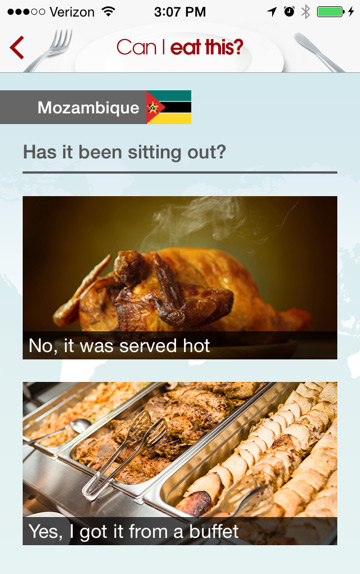Release #: Vol. 84, No. 6
August 01, 2015
Health Watch: Is It Safe to Eat That Peri Peri Chicken? Drink The Local Tap Water?
A CDC App Can Help You Decide
By John Perkinson, Staff Writer
You’re on a layover and your stomach’s growling because it’s meal time. You head out to a local eatery and contemplate ordering the day’s special. But should you? Could foodborne germs in that tasty-looking dish make you sick?
Before you leave for your next trip, check out a free smartphone app called “Can I Eat This?”
Produced by the Centers for Disease Control and Prevention (CDC), the app asks a series of questions to help you determine whether various local drinks and foods could make you ill. After entering the country you’re in, the app asks what you’re eating or drinking and then where you purchased it and the kind of packaging the product comes in.
Let’s say you’re laying over in Mozambique and want to try the peri peri chicken, a popular local dish that consists of chicken marinated in lemon juice, garlic, and spicy peri peri sauce. The app says that if you order in a restaurant, “It’s probably okay to eat.” However, if you serve yourself from a buffet line, “Eat at your own risk.... Cooking kills bacteria and parasites, but food that has been sitting out, on a buffet, for example, can become contaminated again.”
Perhaps you’re in Hong Kong, thinking about eating alfresco from one of the many street vendors. Can I Eat This? lets you know that “street vendors in developing countries are not well regulated, and the food may be contaminated.... That skewer of mystery meat may look tempting, but we’d hate for you to spend the rest of your [trip] in the bathroom.”
Even in many Western European nations like Germany, the app warns that products like unpasteurized milk “can contain dangerous bacteria, such as salmonella, e. coli, and listeria, which cause many foodborne illnesses.” Yet, on a lighter note, the app observes that while in Germany, “You can drink the tap water, if you are into that sort of thing.”
According to the CDC, “Foods can harbor harmful microorganisms that may cause serious human illnesses. WHO [the World Health Organization, a specialized branch of the United Nations] defines foodborne illnesses as ‘diseases, usually either infectious or toxic in nature, caused by agents that enter the body through the ingestion of food’ and estimates that each year two million people die from diarrheal diseases, mostly attributed to contaminated food and drinking water.” Between 20 to 50 percent of Americans and Canadians who travel overseas develop diarrhea, making it the most common travel-related ailment.
If you do get sick while abroad, most airlines have specific employee policies providing guidance on what you should do. Remember that the U.S. and Canadian embassies in your destination country can help locate medical services and notify your family and friends in the event of an emergency.
The Can I Eat This? app is available for free at Google Play and at the Apple App Store.
![]() ALPA members can contact Aviation Medicine Advisory Service, ALPA’s Aeromedical Office, at 303-341-4435, Monday to Friday, 8:30 a.m. to 4:00 p.m. mountain time, or at www.AviationMedicine.com.
ALPA members can contact Aviation Medicine Advisory Service, ALPA’s Aeromedical Office, at 303-341-4435, Monday to Friday, 8:30 a.m. to 4:00 p.m. mountain time, or at www.AviationMedicine.com.
Common Foodborne Germs that Can Make You Ill
Your odds of getting sick from contaminated food increase when you travel abroad. The source of this illness is often one of the following germs:
- E. coli, spread from contaminated water and food (especially raw vegetables and undercooked ground beef).
- Salmonella, spread from contaminated meat, poultry, eggs, and unpasteurized milk and juice. Other sources include cheese, contaminated raw fruits, and vegetables.
- Listeria, found in raw and processed foods and unpasteurized milk. Unlike other germs, listeria can grow in the cold temperatures of a refrigerator.
- Campylobacter, spread from raw or undercooked poultry, unpasteurized milk, and contaminated water.
- Clostridium perfringens, one of the most common causes of food poisoning in the United States, commonly found in raw meat and poultry.
Be Prepared
The Centers for Disease Control and Prevention warns that in some countries medications may be sold that are counterfeit. The best way to avoid counterfeit drugs is to reduce the need to purchase them abroad. Be prepared and take with you the anticipated amounts of medications you’ll need while on your trip, including any you might need to combat possible intestinal issues.
-###-

